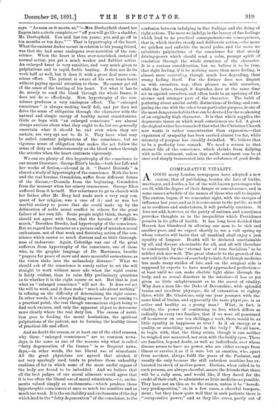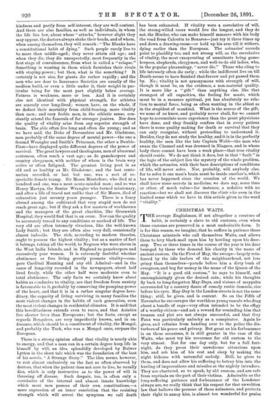COMPARATIVE VITALITY.
AGOOD many London newspapers have adopted a new custom, that of publishing, besides the lists of birthe, marriages, and deaths, a list of the well-known personages who are ill, with the degree of their danger or convalescence, and in some cases a schedule of the names of those who call to inquire. The custom began, if we remember right, with the ravages of influenza last year, and as it is convenient to the public, as well as to creditors and undertakers, it will probably continue. It does not add, however, to the gaiety of nations, and sometimes provokes thoughts as to the inequalities which Providence permits in its gifts of health. It has long been decided that Heaven has blundered in allowing one man to be rich and another poor, and we expect shortly to see a cult spring up whose votaries will insist that all mankind shall enjoy a just equality of languor. Health will be declared unattainable by all, and disease abominable for all, and all will therefore be condemned by the "eternal law of true Socialism" to be neither sick nor well. The great obstacle to the growth of the new cult is the absence of somebody to hate, for though medicine has made many strides of late, and on the surgical side is supposed by experts to have nearly approached perfection— at least until we can make electric light shine through the body, and so reveal disasters in the interior—it has as yet given us little enlightenment as to the secret of vitality. Why does a man like the Duke of Devonshire, with splendid brains and excellent physique, die of exhaustion at eighty- three, while Mr. Gladstone, only one year younger, with the same kind of brains, and apparently the same physique, is as active and healthy as a young man ? What, in fact, is vitality, the power of continuing to live, which differs so radically in every two families, that if we were all pensioned off to-morrow on our ten shillings a week, there would be as little equality in happiness as ever ? Is it an energy, or a quality, or something material in the body P We all know, to begin with, that the thing exists, though it can neither be weighed nor measured, nor seen with the bodily eyes. There are families, beyond doubt, as well as individuals, over whom disease seems to have no power, who are either exempt from illness or survive it as if it were but an emotion, who, apart from accident, always fulfil the years of the Psalmist, and usually die only because the still unbroken machine has ex- hausted its stock of motive-power. Doctors, when called in to such persons, are always cheerful, assure the friends that there will be a rally soon, and would like, if they dared for the credit of their craft, to administer as little medicine as possible. They have not an idea as to the reason, unless it be "heredi- tary predisposition," or, in a few cases, a cheerful tempera- ment; but they know quite well that in such patients there is "recuperative power," and as they like cures, partly out of
kindness and partly from self-interest, they are well content. And there are also families, as well as individuals, in whom the life lies low, about whose "attacks," however slight they may appear, the doctors always shake their heads, and of whom, when among themselves, they will remark : "The Blanks have a constitutional habit of dying." Such people rarely live to be more than middle-aged ; they never attain old age ; and when they die, they die unexpectedly, most frequently in the first stage of convalescence, from what is called a "relapse." Something is wanting in them which furnishes their rivals with staying-power ; but then, what is the something P It certainly is not size, for giants die rather rapidly ; and the men who are dear to Insurance Societies are usually of the medium build, or even a little under it, their weight in par- ticular being for the most part slightly below average. Fatness is weakness, more or less. And it is certainly also not identical with physical strength, for athletes are scarcely ever long-lived; women have, on the whole, if we deduct their mortality from child-bearing, more vitality than men ; and very feeble men, in the athletic sense, con- stantly attend the funerals of far stronger juniors. Nor does the quality of vitality arise from any superior strength of brain. The able often live long and often die young; and as we have said, the Duke of Devonshire and Mr. Gladstone, men probably of the same degree of mental power—the one a Second Wrangler and Smith's Prizeman, the other a Double- First—have displayed quite different degrees of the power of survival. The great lawyers and theologians, men of abnormal acuteness, often reach a vast age ; as do gamekeepers and country clergymen, with neither of whom is the brain very active or often fatigued. The greatest living poet is as old and as healthy as Mr. Gladstone; and the last cente- narian recorded, or last but one, was a sort of re- spectable female tramp. Sir Moses Montefiore, who died at a hundred and one, was a most acute-minded man ; and so was Henry liartyn, the Senior Wrangler who turned missionary, and after a life of travel not unlike that of Sir Moses, died of exhaustion just seventy years younger. There is a fancy abroad among the cultivated that very stupid men do not reach great age; but if they ask a few masters of workhouses and the managers of the great charities, like Greenwich Hospital, they would find that is an error. Nor can the quality be accurately traced to any conditions or method of life. The very old are often intensely vivacious, like the well-known Lady Smith ; but they are often also very dull, occasionally almost imbecile. The rich, according to modern theories, ought to possess the highest vitality ; but as a matter of fact it belongs, taking all the world, to Negroes who were slaves in the West India Islands, and in England to gamekeepers and excessively poor women. It is extremely doubtful whether abstinence or free living greatly promote vitality—com- pare Cardinal Manning and any old Admiral—and in the cases of longevity recorded in the newspapers, about half lived freely, while the other half were moderate even to total abstinence. The only facts we certainly know about habits as conducive to vitality, are that freedom from anxiety is favourable to it, probably by conserving the pumping-power of the heart, and that it is in a rather singular degree here- ditary, the capacity of living surviving in many families the most violent changes in the habits of each generation, even the most violent changes in residential climates. It is said that this hereditariness extends even to races, and that Asiatics live shorter lives than Europeans; but the facts, except as regards Bengalees, are very imperfectly known, and in en. durance, which should be a constituent of vitality, the Mongol, and probably the Turk, who was a Mongol once, surpass the European.
There is a strong opinion afloat that vitality is nearly akin to energy, and that a man can in a certain degree keep life in himself by will, an idea splendidly developed by Bulwer Lytton in the short tale which was the foundation of the best of his novels, "A Strange Story." The idea seems, however, to rest almost exclusively on the fact so often observed by doctors, that when the patient does not care to live, he usually dies, which is only instructive as to the power of will in throwing off disease. Such despair, too, is often only a correlative of the internal and almost innate knowledge which most men possess of their own constitutions,—a mere expression of an inner conviction that the resisting strength which will arrest the symptom we call death has been exhausted. If vitality were a correlative of will, the strong-willed races would live the longest, and they do not, the Hindoo, who can make himself measure with his body the road from Calcutta to Benares—just try it three times up and down a drawing-room—or hold up his arm till it withers, dying earlier than the European. The actuaries' records point to placidity too, and not strong will, as the correlative of vitality, the most exasperating of annuitants being game- keepers, shepherds, clergymen, and well-to-do old ladies, who, in the popular phraseology, "never die." Those who cling to life intensely often die early ; while the indifferent live on till Death seems to have finished that furrow and yet passed them by. No; vitality is not synonymous with strength of will, though it must be, on the evidence, a non-material quality. It is more like a " gift " than anything else, like that strangest of all capacities, the feeling for music, which must be in a measure spiritual, yet has absolutely no rela- tion to mental force, being as often wanting in the ablest as in the stupidest of mankind. What is the source of the gift, we none of us know, and probably never shall, for we cannot hope to accumulate more experience than the great physicians have done, and they frankly confess that in every patient there is some quality making for death or survival that they can only recognise, without pretending to understand it. Besides, they do not study the healthy, and it is in the perfectly healthy, the men like the late Captain Webb—the man who swam the Channel and was drowned in Niagara, and in whose body there cannot have been a weak place—that true vitality should reside. We do not think it does, but in that " fault "in the logic of the subject lies the mystery of the whole problem, which the actuaries, with their bare descriptions of conditions of life, will never solve. Nor, probably, will anybody else, for to solve it one man's brain must be inside another's, which has never happened since the creation of the world. We shall know some secrets in medicine, we dare say, some time or other, of much value—for instance, a sedative with no reaction—but we shall not discover the elixir vitae even in the limited sense which we have in this article given to the word "vitality."



































 Previous page
Previous page